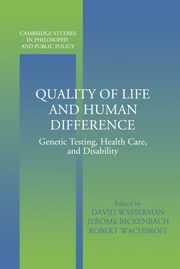Book contents
- Frontmatter
- Contents
- Contributors
- Acknowledgments
- Introduction
- 1 Assessing Quality of Life: Clinical versus Health Policy Uses
- 2 Predicting Genetic Disability while Commodifying Health
- 3 Preventing Genetically Transmitted Disabilities while Respecting Persons with Disabilities
- 4 Disability, Ideology, and Quality of Life: A Bias in Biomedical Ethics
- 5 Values for Health States in QALYs and DALYs: Desirability versus Well-Being and Worth
- 6 Preventing the Existence of People with Disabilities
- 7 Where Is the Sin in Synecdoche? Prenatal Testing and the Parent-Child Relationship
- 8 The Social Context of Individual Choice
- 9 Disability and Health Systems Assessment
- Index
4 - Disability, Ideology, and Quality of Life: A Bias in Biomedical Ethics
Published online by Cambridge University Press: 03 December 2009
- Frontmatter
- Contents
- Contributors
- Acknowledgments
- Introduction
- 1 Assessing Quality of Life: Clinical versus Health Policy Uses
- 2 Predicting Genetic Disability while Commodifying Health
- 3 Preventing Genetically Transmitted Disabilities while Respecting Persons with Disabilities
- 4 Disability, Ideology, and Quality of Life: A Bias in Biomedical Ethics
- 5 Values for Health States in QALYs and DALYs: Desirability versus Well-Being and Worth
- 6 Preventing the Existence of People with Disabilities
- 7 Where Is the Sin in Synecdoche? Prenatal Testing and the Parent-Child Relationship
- 8 The Social Context of Individual Choice
- 9 Disability and Health Systems Assessment
- Index
Summary
The central philosophical concepts regarding disability were constructed not by philosophers but by disability rights activists. Only recently have these concepts received attention in the philosophical literature. This chapter will argue that an important discussion in biomedical ethics is biased against the civil rights interests of people with disabilities because of the failure of philosophers to come to terms with the disability rights movement. Quality of life is conceived in a way that directly conflicts with the Social Model of disability, and the conflict is deeply rooted in biomedical ethical discussion. One particular application will be discussed: the reduction of health care for disabled people because of their allegedly low quality of life.
TWO MODELS
A defining characteristic of the disability rights movement is a particular explanation of the disadvantages experienced by disabled people. Disadvantages are explained as effects not of biomedical conditions of individuals but of the socially created environment that is shared by disabled and nondisabled people. This environment (it is said) is so constructed that nondisabled people are privileged and disabled people penalized. Disability is a social problem that involves the discriminatory barriers that bar some people but not others from the goods that society has to offer. For this reason, the view is often called the Social Model of disability. It contrasts with the traditional view, sometimes termed the Medical Model, according to which disability is a problem of individuals whose biomedical conditions disadvantage them.
- Type
- Chapter
- Information
- Quality of Life and Human DifferenceGenetic Testing, Health Care, and Disability, pp. 101 - 124Publisher: Cambridge University PressPrint publication year: 2005
- 48
- Cited by



